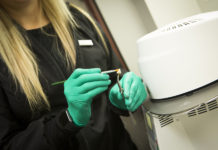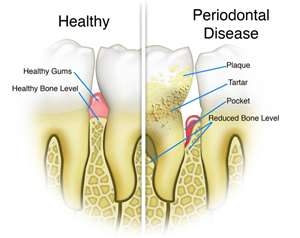Periodontal disease is an infection of the tissues that support your teeth. We now know that the bacteria that causes this infection is also linked to heart related issues. Treatment of periodontal disease is important for overall health.
Periodontal disease attacks just below the gum line in the shallow v-shaped crevice called a sulcus between the tooth and gums, where they cause the attachment of the tooth and its supporting tissues to break down. As the tissues are damaged, the sulcus develops into a pocket. Generally, the more severe the disease, the greater depth of the pocket.
Treatment methods depend upon the type of disease and how far the condition has progressed.
The first non-surgical step usually involves a special cleaning, called root planing and scaling, to remove plaque and tartar deposits on the tooth and root surfaces. This procedure helps gum tissue to heal and periodontal pockets to shrink. This is sometimes referred to as “periodontal” or “deep cleaning.” A local anesthetic may be used to make you more comfortable. And the treatment may be scheduled for one or more visits.
If pockets do not heal after root planing and scaling, periodontal surgery may be needed to reduce the depth of the pockets to make them easier to keep clean.
If you have had a deep cleaning (root planing and scaling), the regular cleanings that will be recommended to you after those treatments are called periodontal maintenance therapy. The cleanings will help keep you at that healthier level.
What Causes Periodontal (Gum) Diseases?
Plaque is a stick film of bacteria that clings to teeth and gums. Even if you brush and clean between your teeth every day, you may not completely remove plaque, especially around the gumline. The bacteria in plaque create toxins that injure the gums and underlying bone. Over time, these toxins can destroy gum and bone tissue.
Signs Of Periodontal (Gum) Disease
- Gums that bleed easily.
- Red, swollen or tender gums.
- Gums that have pulled away from the teeth.
- Pus between the teeth and gums when the gums are pressed.
- Persistent bad breath or bad taste.
- Permanent teeth that are loose or separating.
- Any change in the way your teeth fit together when you bite.
- Any changes in the fit of partial dentures.
You don’t have to lose teeth to periodontal disease. Brush, clean between your teeth, eat a balanced diet and schedule regular dental visits for a lifetime of health smiles.












